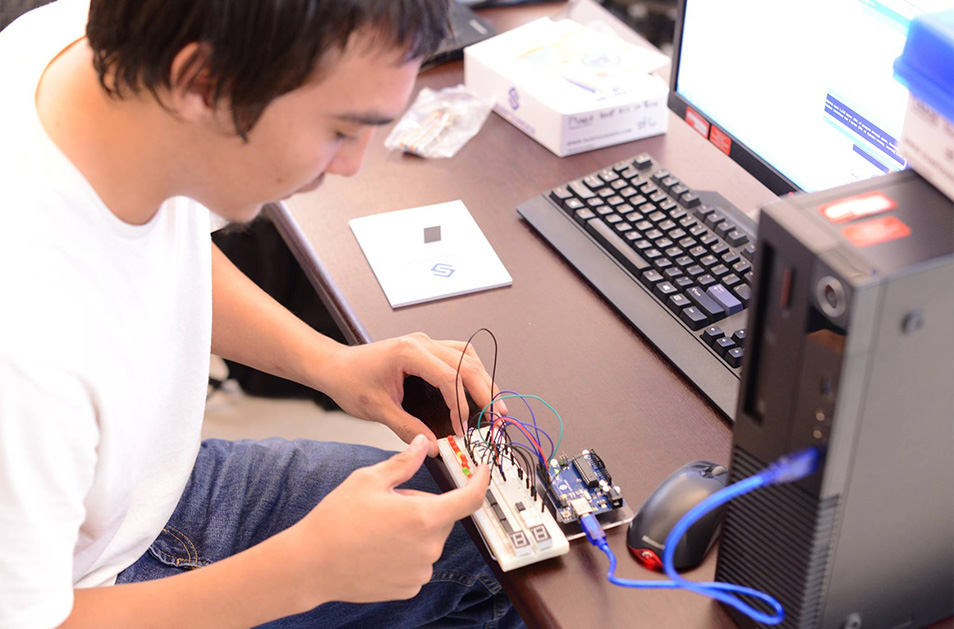The Electrical Engineering (B.S.) Program is accredited by the Engineering Accreditation Commission of ABET, https://www.abet.org, under the General Criteria and the Electrical, Computer, Communications, Telecommunication(s) and Similarly Named Engineering Programs Program Criteria.
http://www.navajotech.edu/

A student needs to complete general courses and general education electives within the first two years of study with a grade point average of 2.0 or better before taking the upper level core courses (300 and 400-level courses). However, to complete the program within four years, a credit load of 15 to 18 is recommended.
The electrical engineering program is designed to prepare students to design and improve electrical, electronic and computer systems. The program combines practical exposure to the most modern technologies available with a theoretical foundation that empowers students to master future changes and innovations.
Pre-EE Requirements - 15 Credits
Core EE Requirements - 60 Credits
General Education Requirements - 39 Credits
Concentration Electives - 15 Credits
Students can select the following area of concentration:
- Computer Engineering/Digital Systems
- Electric Power and Energy Systems
- Manufacturing
Engineering Accreditation Commission (EAC)
Program Educational Objectives (PEOs) for a Bachelor of Science (B.S.) Degree in Electrical Engineering (EE)
The Navajo Technical University (NTU) engineering alumni will show that they meet expectations by performing within one or more of these parameters in five to seven years after graduation:
- Show progress in their career through greater supervisory tasks, advancing to larger managerial responsibility or increasing technical accountability.
- Acquire professional engineer’s license, other certifications of expertise in technical areas or attend graduate school in an appropriate technical discipline.
- Demonstrate success by continuing employment and/or technical accomplishments as entrepreneurs, civil servants or in commercial or industrial endeavors.
Student Learning Outcomes (SLOs) for a Bachelor of Science (B.S.) Degree in Electrical Engineering (EE)
Student Learning Outcomes (SLOs) demonstrate what students are expected to know at the time of graduation.
- an ability to identify, formulate, and solve complex engineering problems by applying principles of engineering, science, and mathematics
- an ability to apply engineering design to produce solutions that meet specified needs with consideration of public health, safety, and welfare, as well as global, cultural, social, environmental, and economic factors
- an ability to communicate effectively with a range of audiences
- an ability to recognize ethical and professional responsibilities in engineering situations and make informed judgments, which must consider the impact of engineering solutions in global, economic, environmental, and societal contexts
- an ability to function effectively on a team whose members together provide leadership, create a collaborative and inclusive environment, establish goals, plan tasks, and meet objectives
- an ability to develop and conduct appropriate experimentation, analyze and interpret data, and use engineering judgment to draw conclusions
- an ability to acquire and apply new knowledge as needed, using appropriate learning strategies
The program currently has three concentrations:
- Computer Engineering / Digital Systems
- Electrical Power and Energy Systems
- Mnaufacturing
Additional concentrations can be added to the program as world needs and student interest evolve.

| Estimated Cost of Attendance | $16,022/academic year |
|---|---|
| Tuition and Fees | $2,402 |
| Room and Board | $6,920 |
| Books and Supplies | $2,600 |
| Transportation | $1,600 |
| Personal/Misc | $2,500 |
Degree Checklist (PDF) ABET Self-Study Report Enrollment Data
Program Advisor
Dr. Peter Romine, Associate Professor of Electronics and Computer Engineering
Email: promine@navajoech.edu
Ph.D., Computer Engineering, University of Alabama
M.S., Engineering, University of Alabama
B.S., Electrical Engineering, University of Alabama

